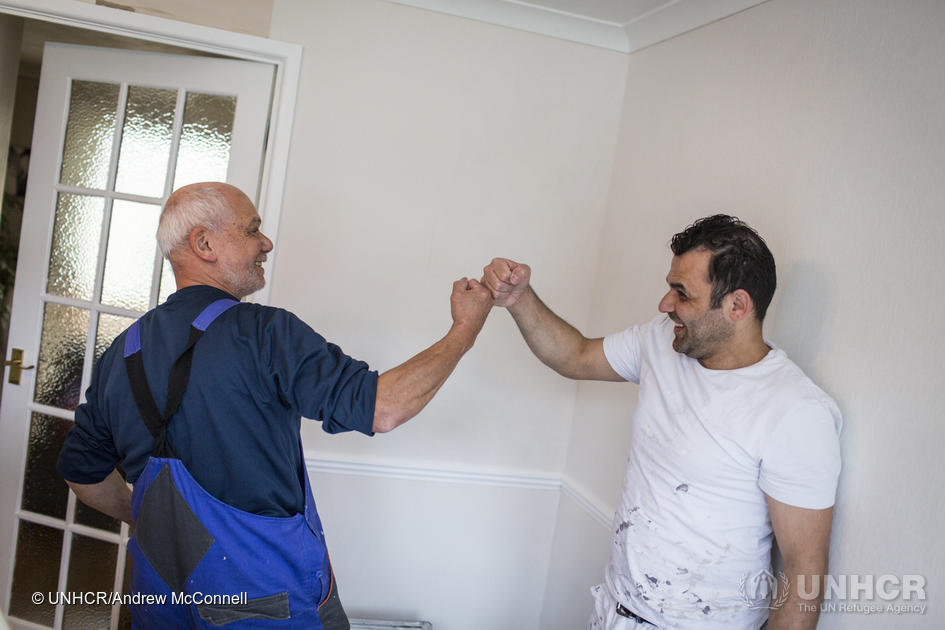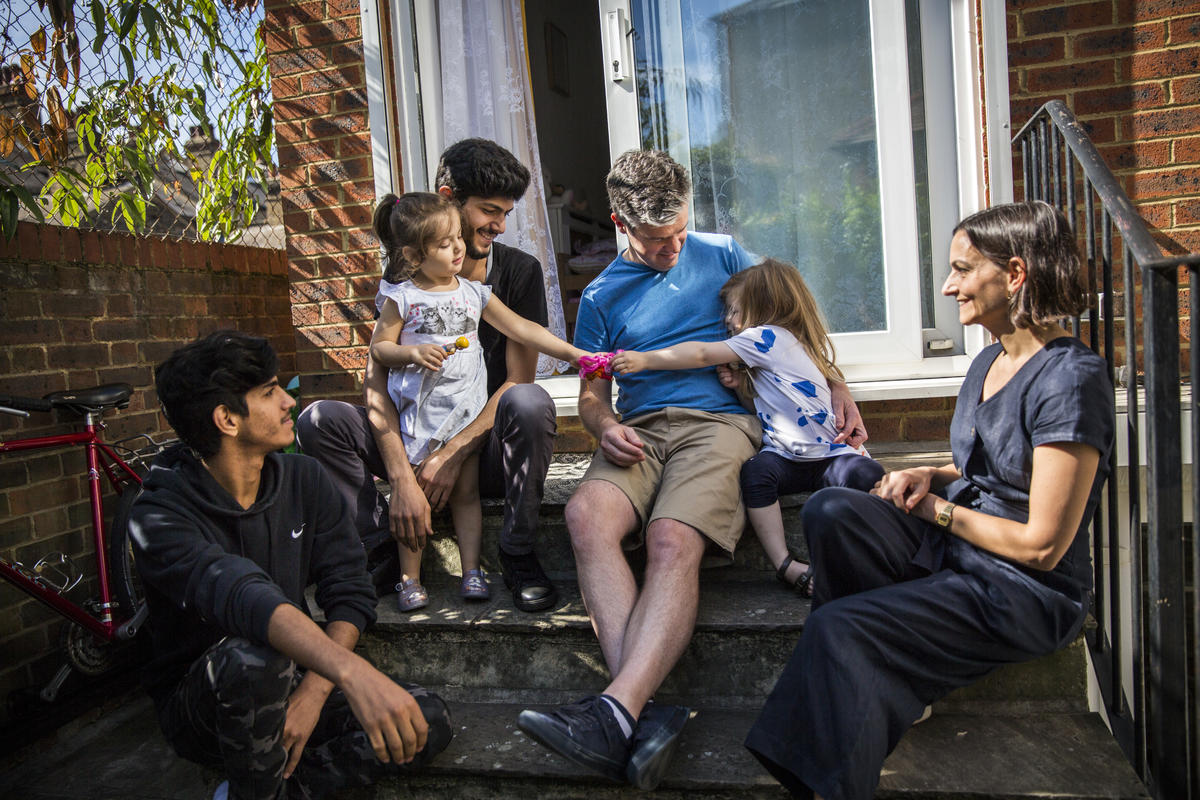The UK's Syria Resettlement Progamme: Looking Back, and Ahead
The UK's Syria Resettlement Progamme: Looking Back, and Ahead

LONDON - The UK has just announced the closure of the Syrian Vulnerable Persons Resettlement Scheme (VPRS), which offered safety to 20,000 refugees fleeing the Syrian crisis over the last five years or so.
Below are answers to some questions about the programme, and what might come next, as well examples of lives transformed.
What was the VPRS?
Resettlement is the transfer of refugees from an asylum country to another state that has agreed to admit them and ultimately grant them permanent residence and, usually, a path to citizenship. The VPRS was a resettlement programme announced by the UK in 2014 to bring victims of the crisis to safety in the UK and due to be completed in 2020.
Under the VPRS, UNHCR referred potential cases to the UK Home Office, which then verified cases against eligibility criteria and carried out checks. Those accepted were referred to the devolved administrations and local authorities, which received support from central government. In July 2017, the Government expanded the scope of the scheme to include refugees who had fled the conflict in Syria but did not have Syrian nationality.
The completion of the VPRS was delayed in 2020 after arrivals were suspended during the pandemic, but the 20,000 refugees have now arrived. It was the largest formal resettlement programme that the UK has undertaken in the modern era.
Was it Successful?
UNHCR believes that it was transformative to the refugees who were able to benefit. “VPRS offered a lifeline to 20,000 refugees, all victims of the Syria crisis that has been running for ten long years,” said Rossella Pagliuchi-Lor, UNHCR’s Representative in the UK. “The programme has been hugely beneficial for the refugees, who have been able to rebuild their lives in safety, thanks to the generosity of the British people. It was a great example of responsibility-sharing and set a high standard in refugee resettlement.”
Ms. Pagliuchi-Lor added: “The Government launched this scheme with UNHCR but IOM, local authorities, NGOs, and local volunteers have been critical to its success.”
In 2017, UNHCR released a study on the integration outcomes for refugees resettled under VPRS. Two-thirds of arrivals at that stage were survivors of violence and torture or had specific medical needs. While the study showed the programme working well, it nevertheless highlighted areas for improvement, notably in English language provision, and further support for housing and employment.
Life-changing
Over the years, UNHCR UK profiled some of those who benefitted from the life-changing impact of the VPRS, and locals who helped make it a success. Many of these stories are profiled through our Great British Welcome series from all parts of the United Kingdom.
Back in 2017, we met Ramzy and Hamza, among the first arrivals and part of a small group of refugees who had been settled in South Oxfordshire. In Abingdon, they found a circle of people centred around St Ethelswold’s House eager to help and support.
In Hastings, Rossana Leal, who had herself fled from Chile decades earlier, set up the Buddy Project to help Syrian refugees weighed down by paperwork and bureaucracy as they struggle to find their feet in a new country. Today, there are more than 100 buddies and they share Sunday roasts, visit local sites and festivals, run sewing groups, driving lessons and children’s activities for the refugees.
In Ipswich, we met Suffolk Refugee Support, a charity that works closely with the local authority to offer resettled refugees a brighter future. One of the refugees, Shireen, 21, felt she had found her feet and was working as an assistant at a chemist. She aimed to become a pharmacist after training. “I feel I’m doing something. I can give my mum money and I have some independence. I also feel I’m giving to society,” she said.
In Northern Ireland, Rada spoke about the specialist medical care that her daughter Daria would receive, after suffering injuries and losing a kidney following a blast in Syria. In Ulster, government ministers praised the local community for welcoming the refugees, as well as the role played by those resettled in enhancing the cultural life in the region.
What’s Next for UK Resettlement?
The UK Resettlement Scheme (UKRS) was announced by the Home Office in June 2019. The start was delayed by the suspension of resettlement due to the pandemic (as was the completion of VPRS). The first refugees under UKRS have started arriving.
The UKRS is meant to consolidate three programmes: the VPRS, the Vulnerable Children’s Resettlement Scheme (VCRS) and the Gateway Protection Programme. As such, it will enhance the flexibility and geographical diversity of resettlement, and should include a contingency for emergency resettlement and retain the Community Sponsorship programme (see below).
UNHCR continues to identify refugees facing protection risks around the world for the new programme. UNHCR hopes the UK will provide more details on its UK resettlement plans soon. Confirming new quotas will offer hope for desperate refugees and allow UNHCR and those working on the crucial programme -- like local authorities -- to make plans.
What is Community Sponsorship?
The Government’s Community Sponsorship programme, running since 2016, enables community groups to become directly involved in supporting refugee families resettled in the UK, previously through VPRS and in future through UKRS. Under community sponsorship, volunteers provide specific support in the early days of arrival including arranging English lessons and schools, helping with access to benefits, housing, healthcare and employment or training. There are commitments for 12 months (longer for housing) and the rest is up to the supporters and the families. The aim is for refugees to be able to stand on their own feet over time and create truly independent and anchored lives in the UK.
UNHCR recently travelled across the UK to meet refugees who have settled here under the scheme, and locals lending them a hand. The stories can be seen here. Rosie Hall, from a group in Devon, said: “It’s been good for us. The town’s been really supportive and it’s actually brought the community together.”
What about global resettlement?
Unfortunately the numbers are falling. UNHCR estimates that 1.44 million refugees globally are in need of resettlement, but only 22,770 were resettled through UNHCR last year, with 829 arriving in the UK. “These are the lowest numbers we have seen in almost two decades – just when refugees’ needs are extremely acute and rising,” UNHCR’s Ms. Pagliuchi-Lor said. There are hopes for larger numbers being able to resettle in the years ahead, but even the most optimistic forecast falls woefully short of needs.
More details on global resettlement are available on the UNHCR website.






